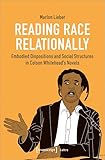Reading Race Relationally : Embodied Dispositions and Social Structures in Colson Whitehead's Novels / Marlon Lieber.
Material type: TextSeries: LettrePublisher: Bielefeld : transcript Verlag, [2023]Copyright date: ©2023Description: 1 online resource (270 p.)Content type:
TextSeries: LettrePublisher: Bielefeld : transcript Verlag, [2023]Copyright date: ©2023Description: 1 online resource (270 p.)Content type: - 9783839463468
- African American Literature
- America
- Colson Whitehead
- Literary Studies
- Literature
- Pierre Bourdieu
- Postcolonialism
- Race and Racism
- Racism
- LITERARY CRITICISM / American / General
- African American Literature
- America
- Colson Whitehead
- Literary Studies
- Literature
- Pierre Bourdieu
- Postcolonialism
- Race and Racism
- Racism
- 813.609 23/eng/20230417
- PS3573.H4768 Z73 2023
- online - DeGruyter
| Item type | Current library | Call number | URL | Status | Notes | Barcode | |
|---|---|---|---|---|---|---|---|
 eBook
eBook
|
Biblioteca "Angelicum" Pont. Univ. S.Tommaso d'Aquino Nuvola online | online - DeGruyter (Browse shelf(Opens below)) | Online access | Not for loan (Accesso limitato) | Accesso per gli utenti autorizzati / Access for authorized users | (dgr)9783839463468 |
Frontmatter -- Contents -- Acknowledgments -- Introduction: Reading / Race / Relationally -- 1. Reading the Past, Writing the Future: The Intuitionist -- 2. Ab/uses of History: John Henry Days and Apex Hides the Hurt -- 3. (Post-Black) Bildungsroman or Novel of (Black Bourgeois) Manners? Sag Harbor -- 4. Money, Abstraction, Cultural Production: John Henry Days and Apex Hides the Hurt Revisited -- 5. The Masterless Ocean: Zone One -- Conclusion: To Escape the Fundamental Principles of Your Existence -- Works Cited
restricted access online access with authorization star
http://purl.org/coar/access_right/c_16ec
What does it mean to write African American literature after the end of legalized segregation? In this study of Colson Whitehead's first six novels, Marlon Lieber argues that this question has permeated the Pulitzer Prize-winning author's writing since his 1999 debut The Intuitionist. Drawing on Pierre Bourdieu's relational sociology and Marxist critical theory, Lieber shows that Whitehead's oeuvre articulates the tension between the persistent presence of racism and transformations in the United States' class structure, which reveals new modes of abjection. At the same time, Whitehead imagines forms of writing that strive to transcend the histories of domination objectified in social structures and embodied in the form of habitus.
funded by Frankfurt Forschungszentrum Historische Geisteswissenschaften
Mode of access: Internet via World Wide Web.
In English.
Description based on online resource; title from PDF title page (publisher's Web site, viewed 25. Jun 2024)


